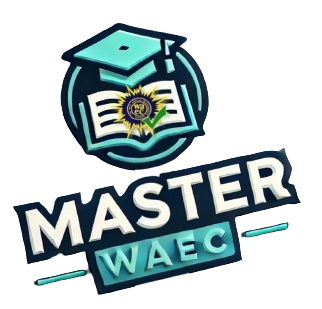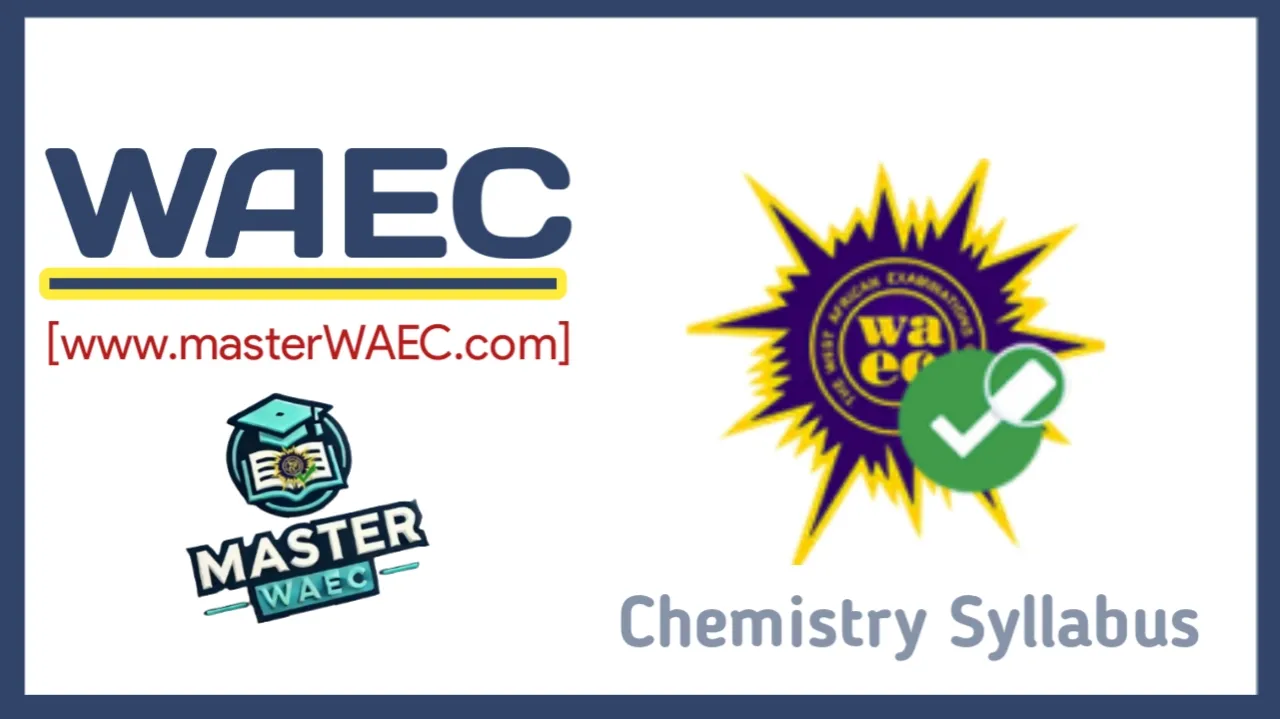Preparing for the 2025 WAEC Chemistry exam starts with understanding the syllabus. The WAEC Chemistry syllabus 2025 is like a roadmap that shows all the topics you need to study, the skills you need to develop, and the type of questions you will face in the exam. It also outlines the practical activities you should know and how to apply Chemistry to real life problems.
Knowing the syllabus is very important because it helps you focus on what matters most. Instead of studying aimlessly, you can use the syllabus to organize your study time and make sure you cover every topic. This will give you confidence and increase your chances of success.
In this guide, we have broken down the WAEC Chemistry syllabus into simple and clear sections. We will explain the key topics, exam format, and practical tips to help you prepare effectively. By following this structured approach, you will be ready to tackle the exam with ease.
About WAEC Chemistry Syllabus 2025
The WAEC Chemistry syllabus 2025 is designed to guide candidates in their preparation and ensure they focus on the essential areas of study. Below is a summary of its aims and examination structure:
Aims and Objectives
The WAEC Chemistry syllabus aims to:
- Help students understand the basic concepts of Chemistry, including its theories, principles, and applications.
- Develop laboratory skills while promoting awareness of hazards and safety measures during experiments.
- Show the connections between Chemistry and other subjects like Physics, Biology, and Mathematics.
- Highlight the role of Chemistry in industry, the environment, and everyday life, including its benefits and potential hazards.
- Build critical and logical thinking skills to help students analyze and solve problems effectively.
Examination Scheme
The WAEC Chemistry exam is divided into three main papers that test both theory and practical skills:
Paper 1: Objective Questions
- Consists of 50 multiple-choice questions.
- Covers common topics for all candidates.
- Duration: 1 hour, with a total of 50 marks.
Paper 2: Essay Questions
- Includes short and long structured questions.
- Section A focuses on common topics for all candidates, while Section B includes country-specific topics.
- Duration: 2 hours, with a total of 100 marks.
- Paper 3: Practical Exam/Alternative
- Practical exam for school candidates or an alternative practical for private candidates.
- Tests include quantitative and qualitative analysis and other practical activities.
- Duration: 2 hours for school candidates or 1 hour 30 minutes for private candidates, with a total of 50 marks.
Understanding these aims and the exam format will help you prepare effectively and confidently for the WAEC Chemistry 2025 exam.
WAEC Chemistry Syllabus 2025
The WAEC Chemistry syllabus 2025 covers a wide range of topics designed to help students build a strong foundation in Chemistry. Below is a breakdown of the key topics:
1. Introduction to Chemistry
- Learn the basics of measurement techniques, including the use of SI units.
- Understand the scientific method: observation, hypothesis, experimentation, and conclusion.
2. Atomic Structure
- Study the evolution of atomic theories, from Dalton to Bohr’s model.
- Explore isotopes, atomic numbers, and electron configurations of elements.
3. Periodic Table
- Understand the periodic trends, such as atomic size and ionization energy.
- Learn about the periodic laws and the classification of elements into metals, non-metals, and metalloids.
4. Chemical Bonding
- Study the formation of ionic, covalent, and metallic bonds.
- Understand the properties of compounds formed through different types of bonding.
5. States of Matter
- Learn the kinetic theory of matter and how it explains the behavior of solids, liquids, and gases.
- Understand gas laws such as Boyle’s and Charles’s laws, and their applications.
6. Stoichiometry
- Master writing and balancing chemical equations.
- Understand the mole concept and calculate quantities in chemical reactions.
7. Energy Changes
- Differentiate between exothermic and endothermic reactions.
- Learn about enthalpy changes in processes like combustion and dissolution.
8. Acids, Bases, and Salts
- Study the properties of acids and bases, including their reactions and pH levels.
- Conduct titration experiments to determine concentrations of acids and bases.
9. Organic Chemistry
- Explore functional groups such as alkanes, alkenes, and alkynes.
- Learn the uses of organic compounds in everyday life, such as fuels and plastics.
10. Industrial Chemistry
- Understand the role of Chemistry in industries and its impact on the environment.
- Study topics like pollution control, biochemistry, and sustainable practices.
Focusing on these topics will help you prepare thoroughly for the exam and apply Chemistry to real world problems.
ALSO READ: WAEC Syllabus for Physics 2025: Proven Rodmap to A1
WAEC Chemistry Syllabus 2025 PDF Download
Key Practical Skills for WAEC Chemistry 2025
Practical knowledge is a vital part of the WAEC Chemistry syllabus. Mastering these skills will not only help you perform well in the practical examination but also deepen your understanding of Chemistry concepts. Here are the key practical skills you need to focus on:
Measurement and Preparation of Solutions
- Learn how to measure mass, volume, and temperature accurately using laboratory equipment.
- Prepare solutions with specific concentrations by diluting stock solutions or dissolving solutes in solvents.
- Understand concepts like molarity (mol/L) and standard solutions for titration.
Acid Base and Redox Titrations
- Perform titrations to determine the concentrations of acids and bases using indicators like methyl orange and phenolphthalein.
- Practice redox titrations, such as reactions involving potassium permanganate (KMnO₄) and iron(II) sulfate (FeSO₄).
- Learn to record and analyze results accurately to calculate molarities and reactant ratios.
Qualitative Analysis of Ions and Functional Groups
- Identify cations (e.g., Na⁺, Cu²⁺, Fe³⁺) and anions (e.g., Cl⁻, SO₄²⁻, CO₃²⁻) through characteristic reactions.
- Perform tests for gases like hydrogen (H₂), ammonia (NH₃), and carbon dioxide (CO₂).
- Test for organic functional groups, such as alcohols, carboxylic acids, and alkenes, using reagents like bromine water or Fehling’s solution.
Determination of Reaction Rates and Equilibrium Constants
- Measure how changes in concentration, temperature, and catalysts affect reaction rates.
- Plot and interpret graphs of concentration vs. time to deduce the rate law and reaction order.
- Conduct experiments to determine equilibrium constants (Kc or Kp) for reversible reactions.
By practicing these skills, you wll be well prepared for the WAEC practical exam and gain valuable experience in laboratory techniques.
Also Read: Areas of Concentration for Chemistry WAEC 2025
How to Use the WAEC Chemistry Syllabus 2025
The WAEC Chemistry syllabus is an essential tool for your preparation. When used effectively, it ensures you cover all required topics and practice the skills needed to excel in the exam. Here’s how you can make the most of it:
Step by Step Study Plan
Divide the Syllabus into Sections: Break the syllabus into smaller, manageable parts, such as Atomic Structure, Stoichiometry, and Energy Changes. Focus on one section at a time.
Set Daily or Weekly Goals: Allocate specific topics to each study session, ensuring you complete the syllabus well before the exam.
Revise Regularly: After completing a section, revisit it periodically to strengthen your understanding.
Practical Applications
Conduct Experiments: Use the practical skills section of the syllabus to perform experiments such as titrations, preparation of solutions, and qualitative analysis. This hands on approach will help you understand theoretical concepts better.
Relate to Real Life Problems: Apply what you learn to everyday situations, such as understanding how acids and bases work in cleaning products or the role of Chemistry in environmental pollution.
Importance of Past Questions
Understand Question Patterns: Past questions show the type of questions asked, how they are structured, and the marking scheme.
Identify Key Topics: Repeated questions highlight important areas to focus on.
Practice Time Management: Solve past questions under exam conditions to improve your speed and accuracy.
By following these steps, you’ll stay organized, confident, and well-prepared for the WAEC Chemistry exam.
Additional Tips for Success
Excelling in the WAEC Chemistry exam requires not just hard work but also smart strategies. Below are some practical tips to help you succeed:
Time Management
Create a Study Timetable: Plan your study sessions by allocating time to each topic based on its complexity and your understanding.
Prioritize Challenging Areas: Spend extra time on topics you find difficult, such as Stoichiometry or Organic Chemistry.
Avoid Last-Minute Cramming: Start your preparation early and spread out your study sessions to retain more information.
Exam Strategies
Objective Questions: Read all the options carefully and eliminate incorrect answers to improve your chances of choosing the right one. Manage your time to answer all 50 questions within the hour.
Essay Questions: Write clear, concise answers with diagrams where needed. Focus on key points to maximize marks.
Practical Questions: Ensure you understand the procedure for common experiments and practice recording accurate observations and calculations.
Recommended Resources
- Textbooks: Use WAEC recommended Chemistry textbooks for detailed explanations and practice problems.
- Online Materials: Explore educational websites, YouTube tutorials, and mobile apps for interactive learning and video demonstrations of experiments.
- Past Question Booklets: Get compilations of past WAEC Chemistry questions with solutions to practice regularly.
By managing your time effectively, applying smart exam strategies, and using the right resources, you’ll be well-prepared to achieve excellent results in your WAEC Chemistry exam.
ALSO READ: WAEC Syllabus for Biology 2025
Conclusion
The WAEC Chemistry syllabus 2025 is your ultimate guide to excelling in the 2025 examination. By thoroughly preparing with the syllabus, you can ensure that you cover all the required topics, develop key practical skills, and understand the exam format.
Consistent practice and regular revision are essential for top performance. Solve past questions, conduct experiments, and review your weak areas to boost your confidence and readiness for the exam.
To get started, download the official WAEC Chemistry syllabus 2025 and take the first step toward achieving outstanding results.

Kolade Kayode, known as Mr. KK, I am a Nigerian education blogger and founder of MasterWAEC.com. Passionate about student success, I simplifies WAEC exam preparation with accurate tips and resources to help students excel.

